Mood:
Topic: 101) Kalanus 1986
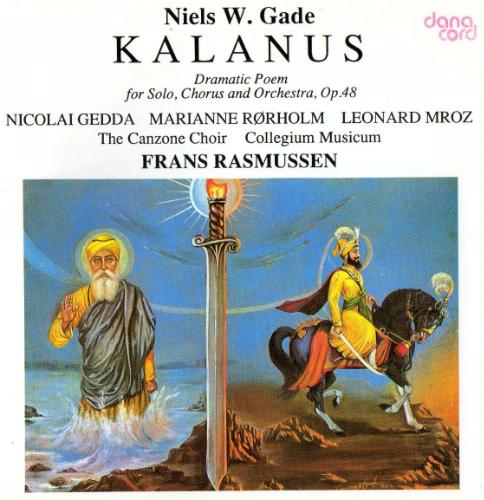

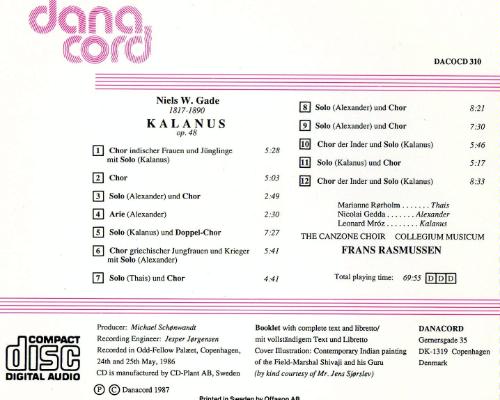
Recorded in Copenhage, May 1986
LINK: DOWNLOAD
Updated: Friday, 20 September 2013 10:54 AM MEST
Post Comment | Permalink | Share This Post
| « | July 2009 | » | ||||
| S | M | T | W | T | F | S |
| 1 | 2 | 3 | 4 | |||
| 5 | 6 | 7 | 8 | 9 | 10 | 11 |
| 12 | 13 | 14 | 15 | 16 | 17 | 18 |
| 19 | 20 | 21 | 22 | 23 | 24 | 25 |
| 26 | 27 | 28 | 29 | 30 | 31 | |



Recorded in Copenhage, May 1986
LINK: DOWNLOAD
1 Le piege de Meduse, Comedie lyrique en un Acte
2 Les Pantins Dansent
Orchestre des Concerts Lamoureux
Aldo Ciccolini
Tendrement
Nicolai Gedda, tenor
Ludions:
Air du rat – Spleen -
La grenouille americaine -
Air du poete - Chanson du chat
Mady Mesple, soprano
Trois poems d'amour:
Ne su que grain d sable
Suis chauve de naissance
Ta parure est secrete
Gabriel Bacquier, bass
Choses vues a droite et a gauche
Yan-Pascal Tortelier, violin
Quatre petites melodies:
Elegie – Danseuse – Chanson – Adieu
Nicolai Gedda
Prelude de la porte heroique du ciel
Aldo Ciccolini, piano
Recorded in Paris, October 1969
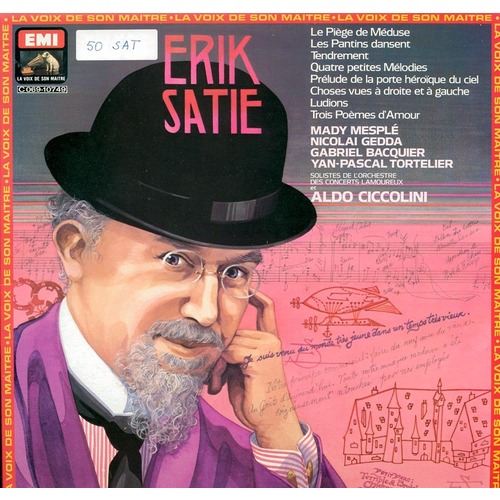
LINK: DOWNLOAD
Performed by Royal Swedish Opera Orchestra
Conducted by Philip Brunelle
Recorded in Stockholm, January 1992
Gustaf Wasa - Anders Aandersson
Christjern II - Nicolai Gedda
Severin Norrby - Tord Wallstroem
Christina Gyllenstierna - Lena Nordin
Cecilia af Eka - Dorrit Kleimert
Margareta Wasa - Eva Pilat
Anna Bielke - Inger Blom
Lars Parre - Staffan Sandlund
Danish Herald - Henrik Westberg
Sweden's Guardian Angel - Marie Dimpker
LINK: DOWNLOAD
Lohengrin - Nicolai Gedda
Elsa von Brabant - Aase Nordmo-Lövberg
Friedrich von Telramund - Rolf Jupither
Ortrud - Barbro Ericson
König Heinrich der Vogler - Bengt Rundgren
Der Heerrufer des Königs - Ingvar Wixell
Pagen - Busk Margit Jonsson, Dorrit Kleinert, Maj-Lie Tollbo, Unni Rugtvedt
Brabantische Edle - John-Erik Jacobsson, Gunnar Lundberg, Lars Carlsson, Bo Lundborg
Kungliga Teaterns Kör und Hovkapellet
Conductor: Silvio Varviso
Recorded live, Stockholm, January 29, 1966
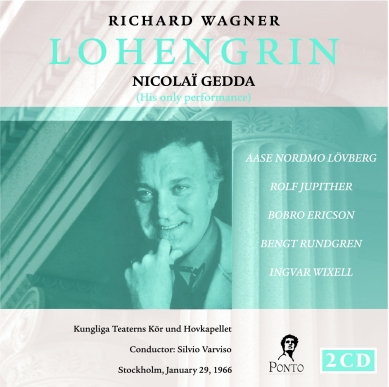
CD 1: DOWNLOAD
CD 2: DOWNLOADCD 3: DOWNLOAD
Colette - Janine Micheau
Colin - Nicolai Gedda
Soothsayer - Michel Roux
Conductor Louis de Froment
Recorded in Paris, April 1956
LINK: DOWNLOAD
Recorded in Monte Carlo, June 1989
LINK: DOWNLOAD
Recorded in London, June 1976
CD 1 (APE): DOWNLOAD
CD 2 (APE): DOWNLOAD
MP3: DOWNLOAD
Riccardo - Nicolai Gedda
Amelia - Liljana Molnar-Talajiæ
Renato - Sherrill Milnes
Ulrica - Stefania Toczynska
Oscar - Sally Arneson
Silvano - Peter Weber
Vienna State Opera chorus and orchestra
Conductor Miguel Gomez Martinez
Recorded on 2 December 1975 in Vienna

CD 1, part 1: DOWNLOAD
CD 1, part 2: DOWNLOAD
CD 2: DOWNLOAD
Synopsis
Chitoor, a city in 13th Century India, is ruled by the noble and just Prince Ratan-Sen, who is married to the beautiful Padmavati.
Disaster looms on the horizon of their peaceful life, however, because the Mogul ruler of Delhi, Alauddin, is approaching Chitoor with an army.
Act I
The opera opens with Alauddin and his envoys coming to Ratan-Sen's court to discuss peace or war. After dances of welcome by the Hindu palace dancers, Alauddin asks to see Padmavati, of whose beauty he has heard. When Ratan-Sen bids his wife to lower her veil, Alauddin seems overcome by her beauty and makes an excuse to leave.
Then Alauddin sends an ultimatum to Ratan-Sen: hand over the beautiful Padmavati, or the city of Chitoor will be sacked. Ratan-Sen refuses. The people of Chitoor lynch Alauddin's cruel messenger, who dies prophesying death for Ratan-Sen and Padmavati and the destruction of Chitoor.
In the final scene of the act, with calls to arms echoing in the distance, Padmavati sings a lament that she should, innocently, be the cause of disaster and prays that she die rather than be separated from Ratan-Sen.
Act II
In the Temple of the god Shiva, Padmavati awaits the return of her husband, who is leading his troops in a desperate sortie against the Moguls. The priests of Shiva tell her that a supreme sacrifice at dawn is necessary to save Chitoor, and that there must be more than one victim.
Ratan-Sen returns, wounded. His army has been routed; a truce is in place until dawn, the deadline to hand over Padmavati. He pictures the horrors that will befall the people of Chitoor. And then Padmavati stabs her beloved husband - the first sacrificial victim - knowing that tradition dictates she commit suttee, or suicide on her husband's funeral pyre. The preparations for her sacrificial death are a solemn ritual that Padmavati handles with dignity and honor. As she is carried, with a final song of terror, to her immolation, Alauddin bursts through the Temple door - too late.
Padmâvâtî, epouse de Ratan-Sen - Marilyn Horne, contralto
Ratan-Sen, roi de Tchitor - Nicolai Gedda, ténor
Alouddin, sultan des Mongols - José Van Dam, bayton
Nakamti, jeune fille de Tchitor - Jane Berbié, mezzo-soprano
Le Brahmane, attaché à Alaouddin - Charles Burles, ténor
Gora, intendant du Palais - Marc Vento, baryton
Badal, envoyé de Ratan-Sen - Laurence Dale, ténor
Le veilleur - Thierry Dran, ténor
Un prêtre - Jean-Jacques Cubaynes, basse
Première femme du Palais - Martine Mahé, mezzo-soprano
Deuxième femme du Palais - Elena Perez, contralto
Un guerrier - Henri Amiel, baryton
Un marchand - Hugues Brambilla, ténor
Un artisan - Gérars Blatt, baryton
Femmes du peuple - Isabel Alvarez, soprano
- Marian Etxeberria, soprano
- Hermina Laborde, soprano
Orfèon Donostiarra
Chef des choeurs: Antxon Ayestarán
Orchestre du Capitole de Toulouse
MICHEL PLASSON
Recorded in the Halle-aux-Grains de Toulouse from 17 till 19 November 1982 and from 1 till 3 Jule 1983
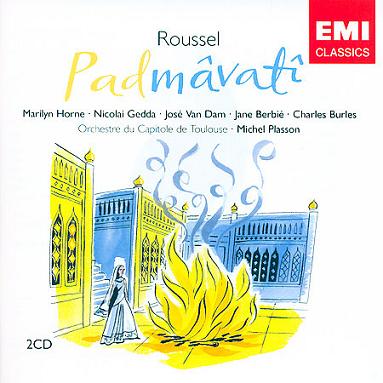
LINK: DOWNLOAD
Conductor
Ensembles
Recorded in London, July 1971
DISC 1: DOWNLOAD DISC 2: DOWNLOAD
Das Wunder der Heliane is set an unnamed totalitarian state in an unknown era.
Act One
The cruel ruler exercises his power the over the land. The Ruler suffers because he is unable to win the love of his wife Heliane. Since he is unhappy, he will not tolerate his subjects living in happiness. A young Stranger has recently arrived in the land and was bringing the people joy; as a result he was arrested and sentenced to death. He will be executed at sunrise. The ruler visits him in order to learn the reason for his actions. The Stranger pleads for mercy but the Ruler is intent on his death. However, he agrees to allow the Stranger to remain unchained this last night of his life. When her husband has left, Heliane comes to the cell to comfort the Stranger. As she speaks to the Stranger and realizes his goodness, her feelings of pity and sadness turn to love. The Stranger tells Heliane how beautiful she is and she reveals to him her long golden hair. She then exposes her bare feet and then, finally, stands completely naked before him. The stranger asks Heliane to give herself to him on his last night of life, but she refuses and goes to the chapel to pray for the Stranger. The ruler returns to the cell, proposing that if the Stranger can teach Heliane to love the Ruler then he will offer him his life and Heliane. Heliane returns, still naked. She is shocked to meet her husband in the cell. In anger, he orders the Stranger's death and Heliane's trial.
Act Two
The ruler and his messenger (also his former lover whom he has rejected) await the coming of the executioner and the members of the high court. Heliane will be tried when the six judges and the blind Chief Justice arrive. The Ruler accuses her of adultery with the Stranger. Heliane cannot deny that she stood naked before the Stranger , but she insists that she gave herself to him in thought only. The Ruler presses his dagger into her breast telling her she should kill herself. The Stranger is brought in to testify but he will not speak, wanting to be left alone for a few moments with Heliane. He kisses her and then takes the dagger and kills himself, making it impossible for the Ruler to prove that Heliane is lying. The Ruler dismisses the court and tells Heliane that she will be on trial before God: if she is innocent, as she claims, she must bring the Stranger back to life. In shock she agrees to undergo the trial.
Act Three
A crowd has assembled outside out side of the Ruler's palace. The Judges together with the Chief Justice arrive to witness Heliane's attempt to bring the Stranger back to life. The messenger stirs up the crowd against Heliane as the test begins. She cries, she will not lie, admitting that she did love the young Stranger. When the ruler sees her cry he wants to save her, but only on the condition that she will be his. Heliane resents her husband more than ever and she refuses this last offer for life. The crowd drags her away to the stake where she will die. Suddenly all are shocked as thunder crashes. Just as suddenly, stars begin to appear in the sky and everyone is amazed to see the young Stranger's corpse rise, transfigured from the funeral bier. By some miracle he is alive. Heliane breaks away from the shocked crowd and runs into the arms of this Stranger whom she loves. In a fit of rage the Ruler plunges his sword into her breast. The Stranger offers a blessing to the people and banishes the ruler whose power is broken. The Stranger takes Heliane in his arms. United in their love they rise to heaven.
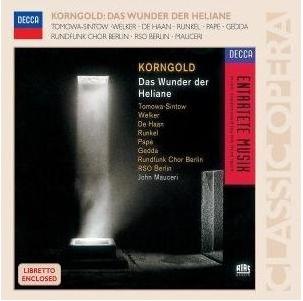
Performers: Nicolai Gedda (Tenor), Hartmut Welker (Tenor), Martin Petzold (Tenor),
Anna Tomowa-Sintow (Soprano), René Pape (Bass), Ralph Eschrig (Tenor),
Reinhart Gröschel (Tenor), Gotthold Schwarz (Baritone), John David De Haan (Tenor),
Julian Metzger (Baritone), Andreas Scholz (Bass), Josef Becker (Bass),
Regine Gebhardt (Soprano), Regina Schudel (Soprano), Reinhild Runkel (Mezzo Soprano)
Conductor: John Mauceri
Orchestra/Ensemble: Berlin Radio Symphony Orchestra, Berlin Radio Chorus
Date of Recording: 02/1992
Venue: Jesus Christus Kirche, Dahlem, Berlin
LINK: DOWNLOAD
Recorded in London, December 1956
LINK: DOWNLOAD
LINK: DOWNLOAD
Zar Peter I - Hermann Prey
Peter Iwanow - Peter Schreier
Van Bett - Gottlob Frick
Marie - Ericka Koth
Witwe Browe - Annelies Burmeister
Marquis de Chateauneuf - Nicolai Gedda
Admiral Lefort - Fred Teschler
Staatskapelle Dresdnen
Chor des Leipziger Rundfunkd
Robert HEGER
1966
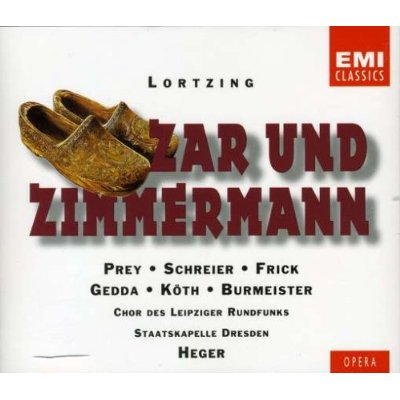
LINK: DOWNLOAD
Philharmonia Orchestra
Alceo Galliera, conductor
Recorded in 1953
Tchaikowsky - Eugene Onegin - Lenski's Aria
Massenet - Werther - Pourquoi me réveiller
Bizet - Les pecheurs des perles - Je crois entendre encore
Massenet - Manon - La rêve
Auber - La muette de Portici - Du pauvre seul
Gounod - Roméo et Juliette - Ah! Lève-toi, soleil
Ponchielli - La gioconda - Cielo e mar!
Verdi - Rigoletto - Parmi veder le lagrime
Flotow - Martha - Ach so fromm
Donizetti - L'elisir d'amore - Una furtiva lagrima
Donizetti - La favorita - Spirito gentil
Cilea - L'Arlesiana - È la solita storia
LINK: DOWNLOAD
LINK: DOWNLOAD
Recorded in London, November 1967
LINK: DOWNLOAD
LINK: DOWNLOAD
LINK (APE): DOWNLOAD
LINK (mp3): DOWNLOAD
Hans Rosbaud, conductor and harpsichord
Janine Micheau (La Folie)
Nadine Sautereau (Clarine, Thalie)
Christiane Castelli (Junon)
Monique Linval (L'Amour)
Michel Sénéchal (Platée)
Nicolai Gedda (Thespis, Mercure)
Jacques Jansen
Huc Santana (Jupiter)
Jean-Christophe Benoit (Momus)
Robert Tropin (un satyre)
Chorus of the Aix-en-Provence Festival, dir Elisabeth Brasseur.
Live recording from Aix-en-Provence, 1956
1.Une vigne en Grèce
2.Le ciel répand ici
3.Poursuis Thespis
4.Qu'ose-t-on, sans l'amour
5.Dieux qui tenez l'univers
6.Mercure, apprenez-nous
7.Que ce séjour est agréable
8.Quelque douce inquiétude
9.Déesse qui régnez dans ces marais superbes
10.Epais nuages
1.Je viens de soulager Junon dans sa colère
2.Aquilons trop audacieux
3.A l'aspect de ce nuage
4.Qu'elle est aimable!
5.Vous vous trompez, Momus6.Danses
7.Je veux finir8.Haine, dépit, jalouse rage
9.Arrêtez! Jupiter n'était point
10.Chantons, célébrons en ce jour
11.Que vois-je?12.Arrête, ingrat
13.Chantons Platée
LINK : DOWNLOAD